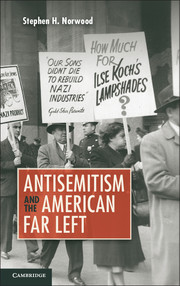Book contents
- Frontmatter
- Dedication
- Contents
- Photos
- 1 Promoting a Socialism of Fools
- 2 American Communists’ Tangled Responses to Antisemitism and Nazism, 1920–1939
- 3 World War II
- 4 Abandoning Assimilation
- 5 “Two, Four, Six, Eight, We Demand a Jewish State”
- 6 “Fiends in Human Form”
- 7 The Jewish Question Discarded
- 8 Shaping the Next Generations
- Notes
- Bibliography
- Index
2 - American Communists’ Tangled Responses to Antisemitism and Nazism, 1920–1939
Published online by Cambridge University Press: 05 June 2014
- Frontmatter
- Dedication
- Contents
- Photos
- 1 Promoting a Socialism of Fools
- 2 American Communists’ Tangled Responses to Antisemitism and Nazism, 1920–1939
- 3 World War II
- 4 Abandoning Assimilation
- 5 “Two, Four, Six, Eight, We Demand a Jewish State”
- 6 “Fiends in Human Form”
- 7 The Jewish Question Discarded
- 8 Shaping the Next Generations
- Notes
- Bibliography
- Index
Summary
Communists during the interwar period elaborated the fierce anti-Zionism laced with antisemitism that the far left embraced in the late 1960s. The Soviets suppressed Zionism and the Hebrew language in Russia. Bolshevik overtures to radical Islamists in Central Asia anticipated those of the American far left in the late twentieth and early twenty-first centuries. The Communists failed to appreciate the central role of antisemitism in Nazi ideology and opposed Jewish emigration to Palestine, which might have saved many from annihilation. During the Moscow trials of 1936 to 1938, the Soviets invoked antisemitism to mobilize the public against the accused. For American Communists and their fellow travelers, the Moscow trials legitimated the use of anti-Jewish conspiracy theories, leading them to justify their use in subsequent Communist bloc show trials and in Arab propaganda.
The American CP’s support for the anti-Jewish pogroms Arab mobs unleashed in Palestine during late August 1929 set a precedent for the far left’s backing for, or excusing, Palestinian terrorist attacks against Jews during the 1960s and after. Much of the CP propaganda on behalf of what it alleged was a “revolutionary Arab uprising” was as viciously antisemitic as that issued by the Black Panthers or SDS during the late 1960s and early 1970s.
- Type
- Chapter
- Information
- Antisemitism and the American Far Left , pp. 22 - 49Publisher: Cambridge University PressPrint publication year: 2013



